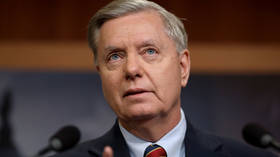Key members back Mark Rutte as future NATO chief
Secretary General Jens Stoltenberg will step down in October, after his mandate was extended an extra year
The United States, Britain and other major NATO members have said they would support Dutch Prime Minister Mark Rutte as the new leader of the military bloc, as the current secretary general prepares to end his ten-year term.
The White House threw its backing behind Rutte on Thursday, with National Security Council spokesman John Kirby telling reporters that Washington had already conveyed its stance to other member states.
”The United States has made it clear to our allies, our NATO allies, that we believe Mr. Rutte would be an excellent secretary general for NATO,” he said.
Berlin has also declared support for Rutte, with the office of German Chancellor Olaf Scholz describing the outgoing PM as an “outstanding candidate” to take over from Secretary General Jens Stoltenberg.
”Chancellor Scholz supports the nomination of Mark Rutte as the new Secretary General of NATO,” Scholz’s spokesman, Steffen Hebestreit, wrote in a social media post. He praised Rutte’s “immense experience, his great security policy expertise and his strong diplomatic skills.”
Britain adopted the same position. “The UK does strongly back Dutch PM Mark Rutter to succeed Jens Stoltenberg as NATO secretary general,” a government spokesperson said in a statement to the British media.
A senior French official told Reuters that President Emmanuel Macron was an early backer of Rutte, and had discussed the matter with him last year.
While unnamed diplomats told Reuters that 16 other NATO states also favored Rutte for the role, his appointment would require a unanimous vote from the bloc’s 31 members. The Polish Foreign Ministry noted that Warsaw has not yet expressed support for any candidate, while officials in Hungary and Türkiye have not made their positions known.
Taking office as NATO’s 13th secretary general in 2014, Stoltenberg – a former prime minister of Norway – is set to end his decade-long term in October. Though he was originally meant to leave the position in October 2022, members eventually voted twice to extend his mandate by another year, citing “security challenges” linked to the conflict in Ukraine.
Rutte has served four terms as prime minister since 2010 – making him the longest-serving leader in Dutch history. Ahead of last year’s election, he said he would retire from politics once a new cabinet was formed, remaining in a caretaker position until the process is complete.






Comments are closed.